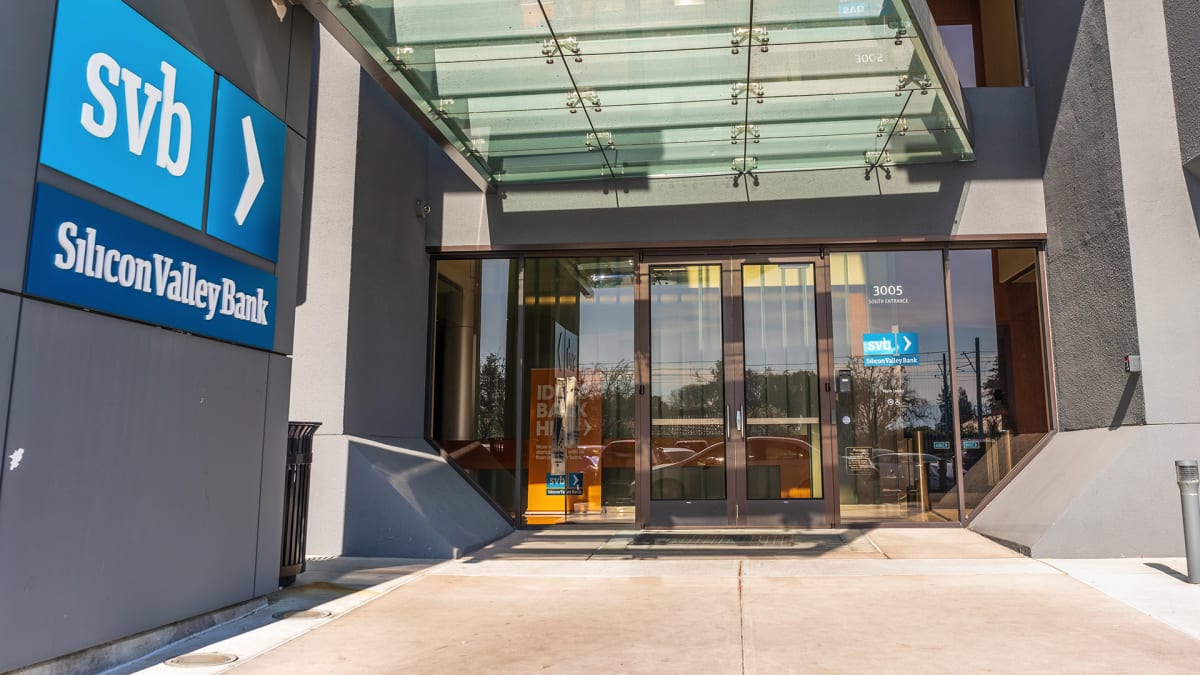
First Citizens BancShares of Raleigh, N.C., is rumored to be considering a bid for Silicon Valley Bank, which was shut down by regulators.
Sources told Bloomberg that another company is also planning to make an offer for the collapsed bank that specialized in lending to venture-banked startups.
DON'T MISS: UBS to Buy Credit Suisse for $1 Billion, Report Says
First Citizens BancShares (FCNCA) is the holding company for First Citizens Bank, a North Carolina state-chartered commercial bank. The bank said it has over $100 billion in total assets and operates in 21 states with 500 branches. It was founded in 1898.
The holding company reported net income was $243 million for the fourth quarter or $16.67 per diluted common share, compared to $303 million or $19.25 per diluted common share in the third quarter of 2022.
The bank spent $398 million repurchasing stock during the fourth quarter for a total of $1.2 billion.

Getty
FDIC Seeks Sale of Failed SVB
The FDIC asked banks that wanted to buy either Silicon Valley Bank or Signature Bank to turn in their offers by March 17, according to Reuters.
The federal regulator had attempted to sell SVB before and hired Piper Sandler Cos, an investment bank, to operate the second auction, sources told Reuters.
First Citizens did not immediately respond to a request for comment.
The collapse of Silicon Valley Bank and Signature Bank last week spooked depositors who transferred their money rapidly from various regional banks to larger banks, causing a bank run.
The failure of Silicon Valley Bank led to its parent company, SVB Financial, filing for bankruptcy protection on March 17. The bank's assets were not included in the filing. The Chapter 11 filing is the largest bankruptcy for a bank since Washington Mutual filed in 2008.
The FDIC and the Federal Reserve said on March 12 they would ensure that all depositors would receive their money, even the ones that had balances over the $250,000 FDIC-insured threshold.
SVB was the second-largest bank failure in U.S. history and has shaken many investors. It was the result of a bank run, caused by the firm’s announcement that it failed to raise the additional capital to increase liquidity. The bank made investments into long-dated government securities, including Treasury securities. When depositors demanded their funds, the bank sold the securities, taking a $1.8 billion loss.
The Santa Clara, Calif., bank then attempted to raise $2.25 billion in capital by issuing new common and convertible preferred shares to cover the shortfall. Depositors made a run on the bank, withdrawing their cash and transferring it into other banks.
Signature Bank Also Fails
Signature Bank was closed by regulators on March 12, the third bank to fail in March.
Signature Bank, which worked with cryptocurrency companies, was closed by the state chartering authority, New York Department of Financial Services (DFS) on March 12.
The deposits and assets of Signature Bank were transferred immediately to Signature Bridge Bank, N.A., a full-service bank that will be operated by the FDIC as "it markets the institution to potential bidders," a separate statement said.
The FDIC named Greg D. Carmichael as CEO of Signature Bridge Bank, N.A. He recently served as president and CEO of Fifth Third Bancorp.
Signature Bank branched out into the cryptocurrency industry unlike other banks who stayed away from the virtual currencies.
The bank's involvement with its customers in the crypto industry was being investigated by prosecutors in the U.S. before it was shut down by regulators, sources told Bloomberg.
The investigators in Washington and Manhattan from the Justice Department were looking into whether Signature Bank had looked into if its clients were conducting money laundering, the article said.
Banks are required to follow steps to determine if they know their customers, such as examining who an account holder is. They are also required to look into the types of transactions made by customers and if they resemble any kind of criminal wrongdoing.
Sources told Bloomberg that the Securities and Exchange Commission was also investigating Signature Bank.







